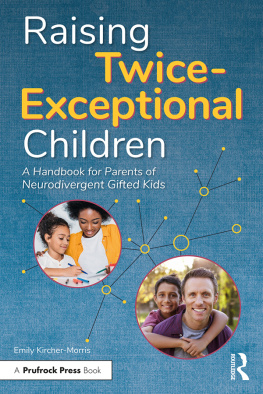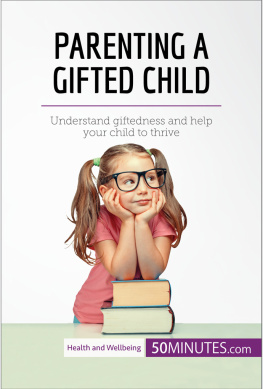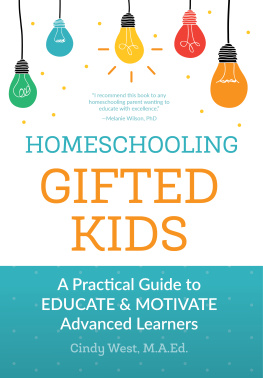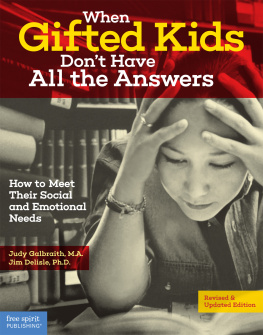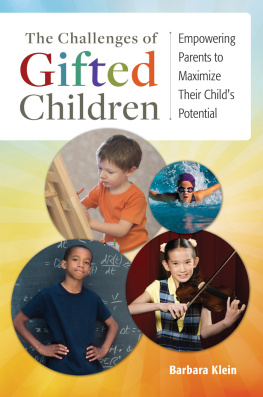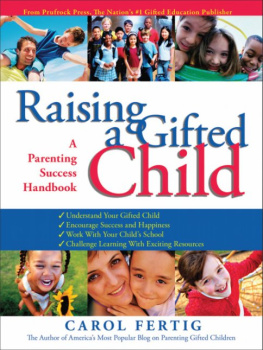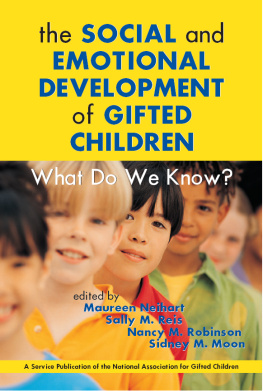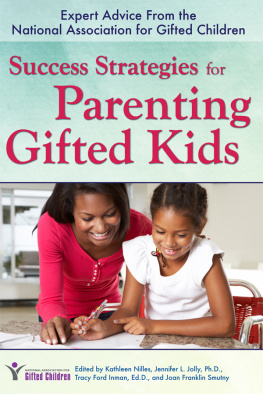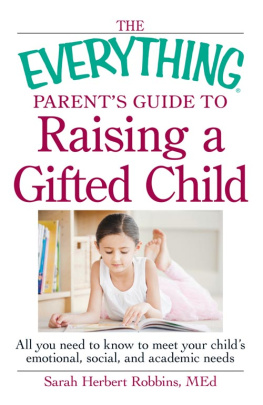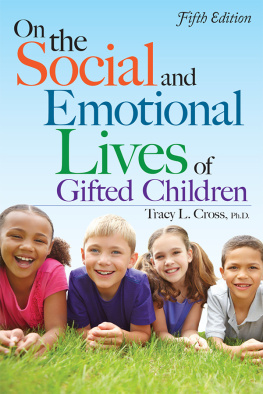
Raising Twice-Exceptional Children
Just because a child is gifted doesnt mean they dont have other types of neurodivergence, like ADHD, autism, dyslexia, and more. Conversely, even children with one of these diagnoses can be cognitively gifted. Raising Twice-Exceptional Children provides you with a road map to understand the complex make-up of your gifted-plus, or twice-exceptional, child or teen.
The book helps you understand your childs diagnosis, meet their social-emotional needs, build self-regulation skills and goal setting, and teach self-advocacy. It also shows you effective ways to collaborate with teachers and school staff, and it offers advice on finding strengths-based strategies that support development at home.
For too long, these kids have fallen through the cracks. This book provides key information on how to best support neurodivergent children by leveraging their strengths while supporting their struggles.
Emily Kircher-Morris, LPC, is a mental health counselor for gifted and twice-exceptional people and host of The Neurodiversity Podcast. Growing up as a twice-exceptional kid led her to pursue supporting neurodivergent kids for her career. She has two identified twice-exceptional kids, and her youngest is still to be determined.
Raising Twice-Exceptional Children
A Handbook for Parents of Neurodivergent Gifted Kids
Emily Kircher-Morris

Cover image: Shutterstock
First published 2022
by Routledge
605 Third Avenue, New York, NY 10158
and by Routledge
2 Park Square, Milton Park, Abingdon, Oxon, OX14 4RN
Routledge is an imprint of the Taylor & Francis Group, an informa business
2022 Taylor & Francis
The right of Emily Kircher-Morris to be identified as author of this work has been asserted in accordance with sections 77 and 78 of the Copyright, Designs and Patents Act 1988.
All rights reserved. No part of this book may be reprinted or reproduced or utilised in any form or by any electronic, mechanical, or other means, now known or hereafter invented, including photocopying and recording, or in any information storage or retrieval system, without permission in writing from the publishers.
Trademark notice: Product or corporate names may be trademarks or registered trademarks, and are used only for identification and explanation without intent to infringe.
Library of Congress Cataloging-in-Publication Data
A catalog record for this book has been requested
ISBN: 978-1-646-32214-5 (pbk)
ISBN: 978-1-003-23753-2 (ebk)
DOI: 10.4324/9781003237532
Typeset in Palatino
by Apex CoVantage, LLC
For Grayson, Maggie, and Trevor
who taught me more about parenting than any degree, expert, or book ever could
For Dave
my partner on this neurodivergent parenting journey
Contents
Guide
Acknowledgments
Im grateful for the people Ive met whose path I crossed or whose journeys aligned with mine for some time. There are too many to mention, but your influence has helped me to reach this life, which I wouldn't change for anything.
Thank you to my clients and their families, whose openness, vulnerability, and growth have shown me the beauty of neurodiversity. Youve taught me about the strength of listening and the gradual process of healing.
Paula Williams, Dora Angevine, Erin Burke, Colleen Chiapel, Beth Cieslak, Madeline Kaleel, Heather Kuehnl, Pam Lueders, and Stefanie ONeill at Unlimited Potential Counseling & Education Center: Youve built an amazing neurodiversity-affirming practice and picked up my slack when Im burning the candle at both ends. Thank you for being a part of this vision.
Thanks to the editors and staff at both Prufrock Publishing and Routledge Taylor & Francis Group for your consistent support and guidance throughout the process of creating this book.
And finally, a debt of gratitude is owed to my family, especially: Pauline Gouvin and Allen Kircher for supporting all of my endeavors and ideas over the years; Grayson, Maggie, and Trevor for being the most amazing, funny, loving kids they are; and Dave Morris, for being my podcast producer and parenting partner, and who loves me more than I probably deserve. (PS Dave Im sorry this isnt a book about dolphins.)
Introduction
DOI: 10.4324/9781003237532-1
Every day, I sit with my clients and their parents in the therapy room. My clients are mostly neurodivergent kids and teens and their parents. I feel comfortable listening to them share their story and help them feel comfortable with it, too. We brainstorm ideas together to help overcome executive functioning difficulties or to improve communication within the family or with peers. We strategize about accommodations that may be effective at home or in the classroom. We celebrate the successes and find the opportunities within the struggles, embracing the slow, plodding work of therapy.
Then I go home to my own family. We are a mostly happy constellation of twice-exceptional folks all living under one roof. And I want you to know that, just like you, Im doing the best I can, minute by minute, with whatever reservoir of patience I can muster.
Im sure youve heard someone joke, If only kids came with a manual! Of course, they dont. And even if they did, a lot of what was in it wouldnt be applicable to our twice-exceptional kids. This book, also, is not a manual. In the business world, a manual provides the exact procedures to complete a specific task, one by one, in order to achieve a certain outcome; I cant provide you with a manual for your child because that is something you and your child need to create that is unique to their own needs. What I can provide is a handbook. A handbook is a framework for developing the procedures that work best for you.
In business, handbooks also align with a mission. The mission of this book is to provide people raising twice-exceptional youth with the tools to create a neurodiversity-affirming environment for their families. Everything within this book aligns with this mission, whether it is talking to your child about their diagnoses, advocating for them in the educational setting, or building the lifelong skills that will help neurodivergent people find success.
For years, my profile picture on social media has been a picture of a white coffee cup with the words Worlds Okayest Mom broadly written across it. I love this reminder that raising kids isnt a contest, that nobody is perfect, and that I am a good enough parent. I promise that I am far from perfect. Parenting twice-exceptional kids means we were thrown into the deep end of parenting without knowing exactly how deep it was.
Ive had people refer to me as an expert and I always cringe at the word. (Once someone referred to me as an influencer. That just made me laugh!) I dont consider myself an expert: I cant be an expert on anyone elses child. You are the expert. Youre the one who has had the experiences that brought you to this place and you are the one who knows your child. I promise you: I dont have all the answers. What I can do is help you brainstorm ideas to help you find the answers that can work for you and your family.
Being a twice-exceptional adult has set me up quite well to write this book. As a gifted/ADHDer, I have had a range of career experiences to draw from. (ADHD adults frequently change jobs.) I started my career as an elementary classroom teacher and then earned a masters degree in education with certification in gifted education. I spent almost ten years as a gifted education facilitator at the elementary and middle school levels. While I was teaching, I went back to school again and earned a second masters degree in school and professional counseling. I worked for a few years as a school counselor while building my private practice where I now provide mental health counseling services to gifted and twice-exceptional people. In 2018, my husband and I started
Next page
